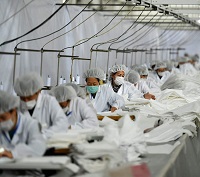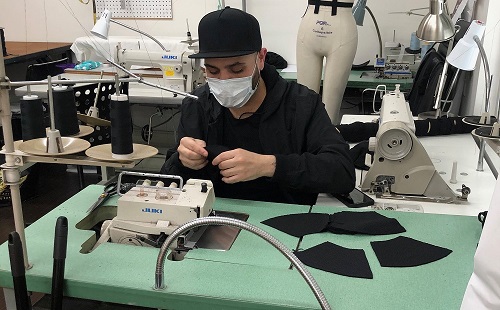 With the global pandemic, US textile and apparel industry is stepping up in a big way to answer the call for much-needed medical equipment. Parkdale Inc, a large yarn spinner in Gastonia, N.C., has collaborated with Hanesbrands, Fruit of the Loom, American Giant, Los Angeles Apparel, AST Sportswear, Sanmar, America Knits, Beverly Knits and Riegel Linen to set up a manufacturing supply chain and begin ramping up production of masks.
With the global pandemic, US textile and apparel industry is stepping up in a big way to answer the call for much-needed medical equipment. Parkdale Inc, a large yarn spinner in Gastonia, N.C., has collaborated with Hanesbrands, Fruit of the Loom, American Giant, Los Angeles Apparel, AST Sportswear, Sanmar, America Knits, Beverly Knits and Riegel Linen to set up a manufacturing supply chain and begin ramping up production of masks.
The companies have already begun production and will make the first deliveries by mid-week. They will create a high output of facemasks. Once fully ramped up in four to five weeks, the companies expect to produce up to 10 million facemasks per week in the US and Central America.
The industry is also reaching out to cut-and-sew operations across the spectrum to help fill the need created by the health crisis. While some companies are already producing medical-related textiles, others are now trying to ramp up their operations to fill the need. Even hospitals are working directly with these companies, while others are tapping into their own supply chains.
Parkdale was able to get involved in the coalition and has converted its factory in Middlesex, N.C., from T-shirt production to medical mask manufacturing. Production should start Tuesday, according to Winthrop, as fabric arrives from Miami, while special machinery he has purchased is in place. Similarly, Beverly Knits Inc., which is involved in the effort led by Hanes and Parkdale, is ramping up production to provide face masks by retooling its production lines. The company is coordinating the production of up to 1.5 million masks produced domestically per week.
manufacturing. Production should start Tuesday, according to Winthrop, as fabric arrives from Miami, while special machinery he has purchased is in place. Similarly, Beverly Knits Inc., which is involved in the effort led by Hanes and Parkdale, is ramping up production to provide face masks by retooling its production lines. The company is coordinating the production of up to 1.5 million masks produced domestically per week.
The Americas Apparel Production Network (AAPN) has set up a special message board to expand the number of companies wanting to participate in the effort. Its members have shared specs and patters, along with resources and company contacts to aid the movement.
Across the spectrum
Many companies are also pitching in on their own to ease the burden during the COVID-19 crisis. For instance, Milliken & Company has increased domestic production of BioSmart fabric. The company has prioritised the production of advanced material in their supply chain to better protect healthcare professionals regularly exposed to bacteria and viruses.
Similarly, BioSmart integrates anti-microbial protection into the most common medical products like scrubs, lab coats and privacy curtains. The patented, bleach-activated technology harnesses the proven power of chlorine bleach to kill 99.9 percent of bacteria and viruses. Manufactured in the US, BioSmart fabric is available through Prime Medical and is equipped with advanced molecular engineering that binds chlorine to fibers to turn otherwise passive textiles into one more layer of active defense against inadvertent microbial exposure, contamination and infection.
In response to the national shortage of surgical-grade face masks, designer Michael Costello has designed a cotton-nylon blend protective mask with a 70 to 74 per cent air filtration effectiveness rate, in comparison to the 97 per cent effectiveness of surgical face masks. The designer reached out to the Centers for Disease Control and Prevention to identify best fabrics for masks, then partnered with a manufacturer to activate specialised machinery that will help his team produce 20,000 protective face masks, which the designer plans to donate to medical professionals, first responders and hospitals in Los Angeles.
Kitsbow, a premium bike apparel brand based in Old Fort, NC, diverted its apparel production to making face shields for first responders, as well as reusable face masks. The company obtained the design of a face shield from the University of Wisconsin-Madison Makerspace. It currently sells the masks at cost to local first responders and medical staff, but plans to distribute internationally as it makes more.
Made in America
It may be early yet to talk about whether the crisis will result in a more companies wanting to manufacture in the US to reduce risks in supply chain but more than half manufacturers are likely to likely to bring production and sourcing back to North America. Many North American companies are forging ahead and seeking solutions, including turning toward domestic sources of supply, a trend which will help shape the next wave of manufacturing.












